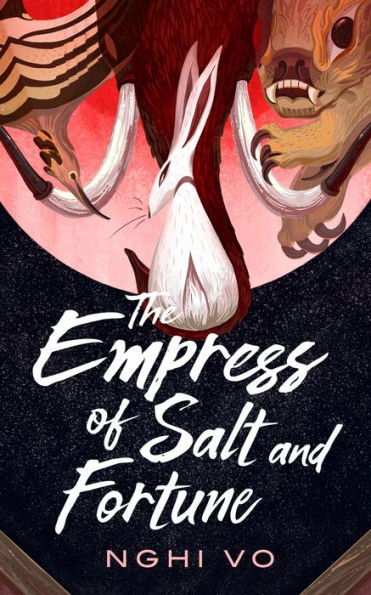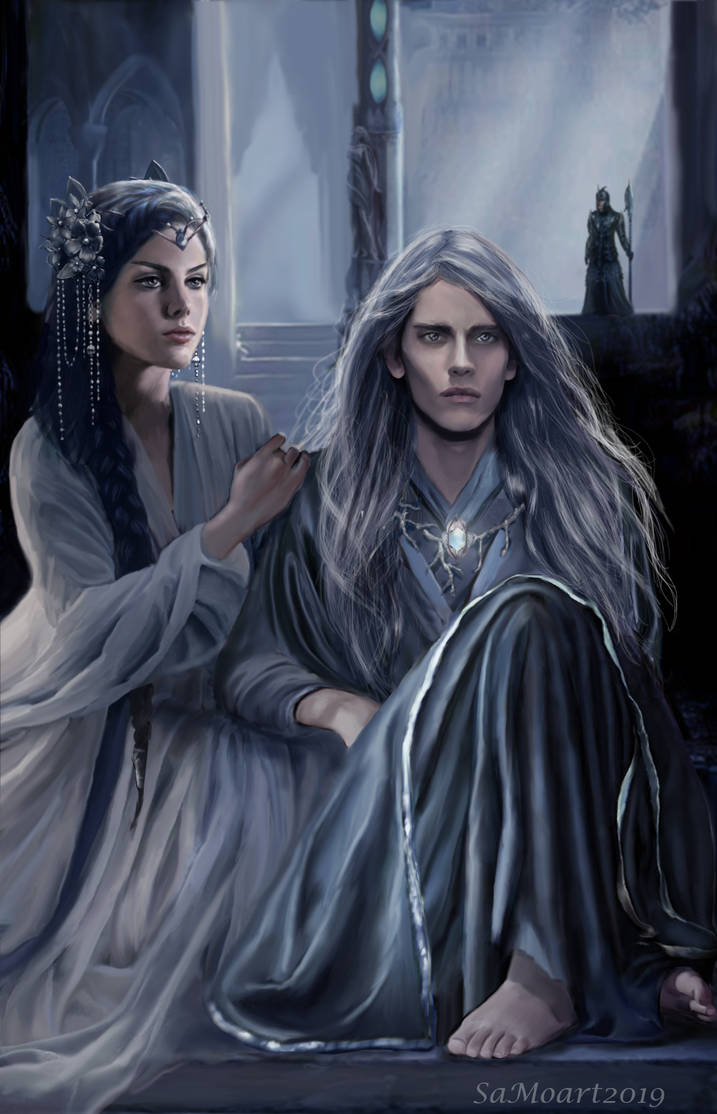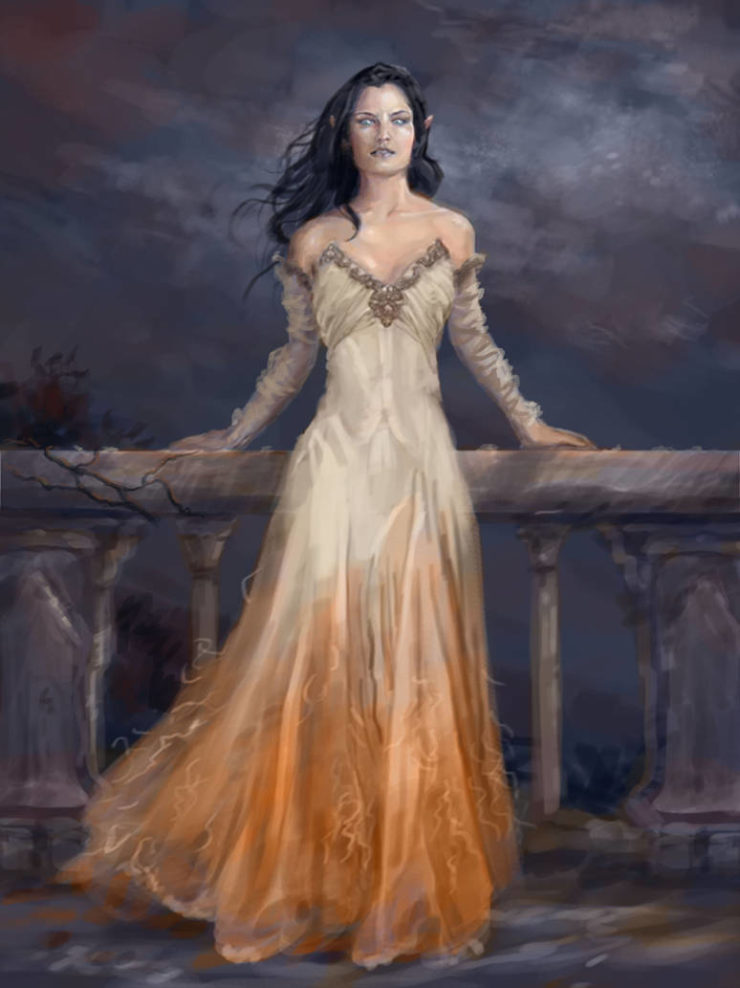In this biweekly series, we’re exploring the evolution of both major and minor figures in Tolkien’s legendarium, tracing the transformations of these characters through drafts and early manuscripts through to the finished work. In place of a new installment this week, please enjoy this encore post: Following our recent two-part discussion of Galadriel, we’re looking back at the story of her friend and mentor Melian, the incarnated Maia whose power, wisdom, and beauty were renowned in the First Age of Arda and who becomes the foremother of some of Middle-earth’s greatest heroes.
“In the gardens of Lórien she dwelt, and among all his fair folk none were there that surpassed her beauty, nor none more wise, nor none more skilled in magical and enchanting song. It is told that the Gods would leave their business, and the birds of Valinor their mirth, that Valmar’s bells were silent, and the fountains ceased to flow, when at the mingling of the light Melian sang in the garden of the God of Dreams” —The Shaping of Middle-earth, hereafter SM, 103.
This passage describes the Maia Melian before she passed over to the hither shore and took up her incarnate form in Middle-earth. Little is known about the divine mother of Lúthien when she dwelt in the Undying Lands. It’s said that she was kin to Yavanna (according to The Lost Road, hereafter LR, 241), the creator of flora and fauna and lover of trees, and that for a time she dwelt in and tended the gardens of the Vala Lórien and of Estë, as he is also called (Morgoth’s Ring, hereafter MR, 147). She’s also called the fairest of all the Maiar (MR 72). And from the passage above, we know that she has a talent for music—a potent power she’ll later pass on to her similarly-gifted daughter, Lúthien. Her voice is so beautiful that all of paradise leaves off its normal activities just to listen to her. She’s the Orpheus of Arda.
It seems, though, that Melian was, if not actually unhappy, at least somewhat discontent with her life in Valinor. The Shaping of Middle-earth reveals that though she lived in the holy light of the two Trees, Melian “loved deep shadow, and often strayed on long journey into the Outer Lands, and there filled the silence of the dawning world with her voice and the voices of her birds” (103). The desire to go to Middle-earth first came into her heart when she “went up upon Taniquetil [to see the stars]; and suddenly she desired to see Middle-earth, and she left Valinor and walked in twilight” (MR 72).
According to one telling, Melian first comes to Middle-earth in Valian Year 1050 (The War of the Jewels, hereafter WJ, 5). She spends many of those early years traveling, filling the “dawning world” with song and with her nightingales. Eventually she settles down in what will later become Doriath, and she’s the one, we’re told, who “fostered” the young woods of Sirion. Melian herself spends most of her time in “the glades of Nan Elmoth beside the River Celon” (WJ 6).
She doesn’t meet Elu Thingol until 1130, according to one timeline (WJ 7). It’s at this point that Melian’s story probably becomes more familiar, especially as it approaches the famed tale of Beren and Lúthien. But first: a different romance.
Melian and Thingol meet as the latter is wandering in the wilderness, having become lost on his way home after a meeting with Finwë (WJ 7; in another version, he’s leading a company that is on its way to Valinor and strays away. See The Book of Lost Tales 2, hereafter BLT2, 41). In a scene that foreshadows (and for us, recalls) Beren’s first vision of Lúthien, Thingol passes by Nan Elmoth, hears nightingales singing, and is entranced. He stumbles into the glade and is at once ensnared by the heart-stopping vision of the goddess with hair like midnight and eyes like the deep wells of time (BLT2 41). In this moment, he sees:
Melian standing beneath the stars, and a white mist was about her, but the Light of Aman was in her face. Thus began the love of Elwë Greymantle and Melian of Valinor. Hand in hand they stood silent in the woods, while the wheeling stars measured many years, and the young trees of Nan Elmoth grew tall and dark. Long his people sought for Elwë in vain. (WJ 7)
Those last two sentences are gross understatements. According to the Annals, Melian kept the unsuspecting Thingol enchanted for over two centuries (MR 89)! And it is an enchantment. Many of the more succinct versions of the meeting of the Maia and the elf lord, such as the one found in The Shaping of Middle-earth, notes that she enchanted him and immediately follows that with the news that they were married and became King and Queen of Doriath. Because of their brevity, they’re sometimes in danger of implying that Thingol had no choice in the matter—but, while Melian certainly has a lot of power over her king (as we’ll see later), the longer tales work diligently to dispel any uneasiness we might have in regards to the validity of their relationship.
Buy the Book


The Empress of Salt and Fortune
Specifically, other versions point out that while enchantment was certainly and to some degree involved in the beginning, Melian and Thingol loved each other profoundly and each made tremendous sacrifices for their relationship. Thingol chooses not to relocate to Valinor with the majority of his people, and Melian, significantly, confines herself to an incarnate body (The Peoples of Middle-earth, hereafter PM, 365). It might be noted here that Thingol gets a great deal out of this exchange: because of his association with Melian he himself becomes something like a Maia in appearance; he is identified as nearly the most mighty of all the Elves, second only to Fëanor; and Doriath, his realm, is a stronghold impregnable to the might of Morgoth. The text “Of Thingol and Melian” says this: “Great power Melian lent to Thingol her spouse, who was himself great among the Eldar; […] he was not accounted among the Moriquendi, but with the Elves of Light, mighty upon Middle-earth” (MR 173). Both Thingol and Melian are regarded with awe and devotion by their people.
Otherwise, Melian’s role as Queen of Doriath often seems minor, primarily because she tends to remain silent, rarely sharing her profound wisdom and offering her counsel mostly to individuals and sometimes after the fact. But in fact, Melian’s power and wisdom upholds the kingdom from the very beginning—and not just through the famed “Girdle of Melian” that keeps all strangers and evil from entering their realm. It was Melian, in fact, who first counseled the building of Menegroth when the power of Morgoth began to grow (WJ 10), and she was its major architect and designer. The Elves and Dwarves commissioned to build the great hall worked “each with their own skills, [and] there wrought out the visions of Melian, images of the wonder and beauty of Valinor beyond the Sea” (WJ 11). And, much like Míriel beyond the Sea, “Melian and her maidens filled the halls with webs of many hues wherein could be read the deeds of the Valar, and many things that had befallen in Arda since its beginning, and shadows of things that were yet to be. That was the fairest dwelling of any king that hath ever been east of the Sea” (WJ 11).
This passage is significant because it points out an important aspect of Melian’s character that emerges time and again: she’s a prophetess or a seer, and often in her divine wisdom knows something of what is to come and counsels accordingly (though, like Cassandra, she’s often ignored, to the detriment of all).
Some time later Melian, using her power as Maia and kin of the Valar, establishes the Girdle of Melian, first to protect the kingdom against the ravages of Ungoliant (WJ 15), and then from the assaults of the servants of Morgoth in general—and later, to keep out those blasted Fëanorians. Out of love for the region of Sirion and reverence for Ulmo, Melian also expands the Girdle westward in order to preserve some of that land unsullied.
Not long after this, the Exiles arrive from Valinor. The Fëanorians are firmly excluded from passing through the mazes of Melian’s magic, but Galadriel is, significantly, welcomed in and becomes a close friend and confident of Melian. In fact, many of the things that mark Lothlórien as a last safe haven in the days of Sauron were likely inspired by Galadriel’s time in Doriath, including its likeness to the gardens of Lórien in Valinor. According to The War of the Jewels, “the pillars of Menegroth were hewn in the likeness of the beeches of Oromë, stock, bough, and leaf, and they were lit with lanterns of gold. The nightingales sang there as in the gardens of Lórien; and there were fountains of silver, and basins of marble, and floors of many-coloured stones” (11). Furthermore, Galadriel’s Lothlórien is protected by the power of the elf-queen’s Ring, much like Doriath is protected by the Girdle of Melian.
It’s through her relationship with Galadriel—we’re told there was “much love between them” (WJ 35)—that Melian first learns much of what happened in Valinor, though Galadriel refuses to speak of the Oath, the Kinslaying, or the treachery of Fëanor at Losgar. But Melian, being divine and also really smart, knows that something terrible has happened and she divines that it’s at least largely, if not entirely, the fault of the Fëanorians. So she goes to Thingol and tells him to beware. “‘The shadow of the wrath of the Gods lies upon them,’” she says; “‘and they have done evil, I perceive, both in Aman and to their own kin.’” Thingol brushes her off, pretty much telling her that it’s not his problem, and that at least they’ll be useful in the fight against the Enemy. Melian tries once more: “‘Their words and their counsels shall have two edges,’” she warns. And they never speak of it again (WJ 42).

Melian doesn’t stop subtly working against the growing power of the Enemy, though. She consistently counsels Thingol against engaging with the Fëanorians after Beren enters the picture, and at one point encourages him to give up the Silmaril to Maedhros without a struggle (SM 220). She also becomes a powerful ally to the children of Húrin and Morwen, even going so far as attempting to intervene in the dark fate of the family (Unfinished Tales, hereafter UT, 79). She sends the young elf-woman Nellas to watch over Túrin’s childhood (UT 83), attempts to harbor Morwen and Nienor from the pursuing hate of Morgoth, and even counsels Túrin to remain in Doriath as long as possible. In an unforgettable scene, that young man snaps back at the wise counsel of the king and queen, arguing that he is fully capable of leaving Doriath and joining the fight against Morgoth. When Melian and Thingol demur, he brashly announces his capability: “‘Beren my kinsman did more.’” Melian (and I image she’s as calm and inscrutable as always) responds, leaving no doubt as to her meaning: “‘Beren,’” she agrees, “‘and Lúthien […]. Not so high is your destiny, I think’” (my emphasis). She then gives Túrin advice which he ignores, and finally tells him to remember her words, and to “‘fear both the heat and cold of [his] heart’” (UT 83).
It’s Melian who will later heal Húrin from the last remnants of Morgoth’s control. She also heals the wounded Beleg, who is attempting to provide protection and companionship to the volatile Túrin, and she sends Beleg back to the bitter exile with a remarkable gift: lembas, the waybread of the Elves. It is said that “in nothing did Melian show greater favour to Túrin than in this gift; for the Eldar had never before allowed Men to use this waybread, and seldom did so again” (PM 404). It was, according to the same text, the sole prerogative of “the queen, or the highest among the elven-women of any people, great or small,” to distribute lembas. This was because it came to them through the hand of Yavanna, the queen of the harvest (PM 404). One has to wonder if Galadriel knew of Melian’s gift and consciously mirrored it when she gave stores of lembas to the Fellowship.
Melian also apparently intervenes with the Valar on behalf of her daughter. Competing legends, Tolkien writes, are told of how exactly Lúthien made it to the Undying Lands to petition for Beren’s life. Some tales say that through a gift of power from her mother, Lúthien crosses the narrow ice at the far north of the world (SM 65). Others say that Melian, in her status as a minor goddess, summoned Thorondor himself and requested that he bring her daughter to the Halls of Mandos (SM 138). Either way, it’s partially through her influence that Lúthien is given an audience and that her request is ultimately granted. Although Melian supports her daughter’s decision to take on a mortal life, the final edict of Mandos nearly breaks her heart. The Grey Annals say that “Melian looked in [Lúthien’s] eyes and read the doom that was written there, and turned away: for she know that a parting beyond the end of the World had come between them, and no grief of loss hath been heavier than the grief of the heart of Melian Maia in that hour (unless only it were the grief of Elrond and Arwen)” (WJ 70-71).
When through treachery the Girdle of Melian is breached and Doriath falls, Melian endures yet more grief. Thingol is slain because of the Silmaril he wears, and Menegroth is broken. Melian the deathless escapes, and she joins Beren and Lúthien briefly in the Land of the Dead that Live—long enough to warn them of the Dwarvish army approaching hot off the sacking of Menegroth. Not long after, Melian “depart[s] to the land of the Gods beyond the western sea, to muse on her sorrows in the gardens whence she came” (SM 161).
What strikes me about the story of Melian is that she gives up the splendor, joy, and privilege of eternal life in Valinor to dwell in the middle-world, a world of shadows as well as light, out of a vast, unreasonable, powerful love. Thus does Melian the Maia, in her willing sacrifice, become the foremother of some of the most powerful, redeeming figures in Middle-earth’s long, scarred history. Her blood runs in the veins of Lúthien, Elwing, Elrond, Elros, Arwen, Elendil, and Aragorn.
I admire Melian for her strength and wisdom, but I also find myself drawn to her silences and her ability to know precisely when it is best to speak and when to listen and observe. And not only that—her ability to enjoy and appreciate even the shadows brought other joy and beauty to Middle-earth. The spiritual light of Aman shines in her face, and she’s accompanied by the birds that make songs in the darkness: an important metaphor in Tolkien for one’s ability to remain hopeful even in the most dire and desperate of circumstances.
Originally published in May 2019.
Megan N. Fontenot is a hopelessly infatuated Tolkien fan and scholar who is yet again very happy that this week’s star didn’t have a special character in her name. Catch her on Twitter @MeganNFontenot1 for scholarly and unscholarly news and other sometimes-tragic tales, and feel free to request a favorite character in the comments!










